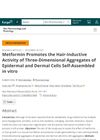Topical Metformin as a Novel Therapy for Alopecia Areata Due to Its Immunologic Effects
August 2023
in “
Medical Hypotheses
”
metformin alopecia areata immunomodulatory properties inflammation autoimmunity mTOR pathway JAK-STAT pathway cellular autophagy AMPK enzyme inflammatory cell proliferation cytokine production stem cell production scalp dryness scalp irritation type 2 diabetes medication hair loss immune system modulation inflammatory response immune response mammalian target of rapamycin pathway Janus kinase-signal transducer and activator of transcription pathway cell self-digestion adenosine monophosphate-activated protein kinase inflammatory cells cell signaling proteins new hair growth dry scalp irritated scalp

TLDR Metformin, usually used for diabetes, can also help treat hair loss from alopecia areata due to its ability to reduce inflammation and stimulate new hair growth.
Metformin, a common treatment for type 2 diabetes, may also be effective in treating alopecia areata, an autoimmune disease causing hair loss. Metformin's immunomodulatory properties can reduce inflammation and autoimmunity in alopecia areata through several mechanisms, including inhibiting the mTOR and JAK-STAT pathways, promoting cellular autophagy, and increasing the cellular AMPK enzyme. These actions decrease inflammatory cell proliferation and cytokine production, key factors in alopecia areata's pathogenesis. Metformin can also stimulate new hair growth by inducing autophagy and stem cell production. Topical application of metformin has been linked to minor side effects like scalp dryness and irritation, but no systemic side effects have been reported. Given its availability and affordability, metformin could be a beneficial treatment for alopecia areata.













